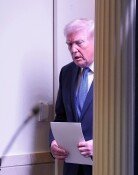[Opinion] Beauty and the Beast
Five years ago, the presidential election in Venezuela attracted as much attention as Beauty and the Beast, when it first came out. Mayor Irene Saez, an ex-Miss Universe contestant, was pitted against Hugo Chavez, a coup d`etat lieutenant colonel, in the election. Saez was said to have the beauty of Eva Peron and the passion of Margaret Thatcher. Until public opinion tilted towards Chavez, there were rumors that Venezuela would have the first most beautiful female president in the world.
President Chavez, hands down winner in this notorious presidential election, must have had an unfortunate affinity with beautiful women. His victory was credited by his public pledge of gouging out abuses in power and for general political reformation. And due to his drastic reformation policy, the path of the beauty, who might be this year`s Miss Universe, was blocked.
The 2003 Miss Venezuela is not able to attend the Miss Universe competition. She couldn`t get the 8,000 dollar participation fee due to strict foreign currency regulations. President Chavez confronted the strikes at the beginning of this year by ordering emergency foreign currency exchange regulations. This order stemmed the decrease in the value of the domestic currency and possible economic crisis, affecting poor Miss Venezuela.
It`s not that big a deal for a beauty to skip a beauty competition, but it is a different story for the citizens of Venezuela. The pride of a nation with beauties who have won the Miss Universe Pageant four times and the Miss World Pageant five times shriveled. Venezuela`s women not being able to participate in beauty contests due to lack of money is like Brazil not being able to participate in the World Cup.
There hasn`t ever been another time in history that these two countries were compared. President Luiz Inacio Lula da Silva, who took office at the beginning of this year, discarded the populism emphasized during the presidential election, but is saving the national economy with logical reformation, putting importance on the market economy. On the other hand, President Chavez has been receiving numerous complaints from his main supporters in the lower classes and from his acquaintance with extreme populism and rapid leftist reformation.
President Chavez is no exception to dictators who put their countries in trouble and who also despise criticism. He has proclaimed this year the `Year of the War on Press` because newspapers have been stirring up anti-government sentiment and has used a firm hand in blocking the import of newspapers under the guise of foreign currency control.
On May 17 he passed a law prohibiting anti-government reporting on TV and radio after the sad news of Miss Venezuela was announced in the foreign media. From here on out, if participants in discussion programs publicly criticize the government, the owner of the broadcasting company takes full responsibility. It might have easier to merely bring the owners of broadcasting companies onto his side, rather than make such laws. Venezuela surely is an extraordinary nation.
Soon Deok Kim, an editorial commissioner yuri@donga.com







